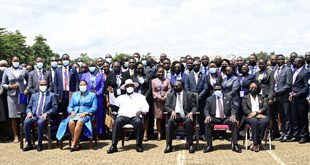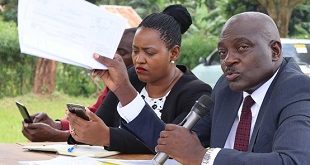
By Julius Odeke
Building on its Kenyan experience in the East African Rift Valley with the Menengai geothermal project, the African Development Bank is working on an ambitious geothermal development program for Africa.
Chawki Chahed Principal Communications Officer said in a press that apart from the gigantic projects such as the 400 MW geothermal development project under implementation in Menengai, Kenya, the AfDB is also working on a series of small-scale geothermal units, adapted to the specific context of each country of the East African Rift Valley having geothermal potential.
It is currently working with the government of Djibouti on the development of a 50 MW power plant in the Lac Assal region. In Ethiopia, the AfDB has played a leading role in defining a geothermal development roadmap.
He says iIn Tanzania, the AfDB is leading the development of the scaling-up renewable energy program of the Climate Investment Funds, which will include the financing of a geothermal development project. In the Comoros, the AfDB has started the identification process for a 20 MW geothermal plant, matching the needs of the archipelago.
As explained by Tonia Kandiero, AfDB Resident Representative in Tanzania, during the 4th African Rift Geothermal Conference held in November 2012 in Nairobi, “Our ambition is to support the accelerated development of the large untapped geothermal resource potential in the Eastern Africa region. Geothermal development has been relatively limited in this region in the past. Only about 217 MW of geothermal energy has been developed so far, most of it being in Kenya. This is insignificant compared to the region’s huge potential, estimated at 10,000 MW in Kenya alone.”
For Youssef Arfaoui, Chief Renewable Energy Expert, “The African Development Bank is now pushing the geothermal agenda with innovative models that help overcome the several risks associated with geothermal development, among which the most important one is the exploratory drilling risk, which is related to the probability of hitting dry wells during the exploration and appraisal drilling phase. The mitigation of the risks will also make off-taker and consumer tariffs affordable.”
The Menengai Project is the first ever project to be approved under the Scaling-up Renewable Energy Program for low-income countries of the Climate Investment Funds.
The Menengai project, once completed, will have tremendous development impact for the Kenyan people by increasing the energy supply in the country by an amount equivalent to the current consumption needs of 500,000 Kenyan households, 300,000 small businesses and some 1,000 GWh for other businesses and industries.
The project will also displace around two million tons of CO² per annum, hence significantly contributing to the fight against climate change.
 The Independent Uganda: You get the Truth we Pay the Price
The Independent Uganda: You get the Truth we Pay the Price


